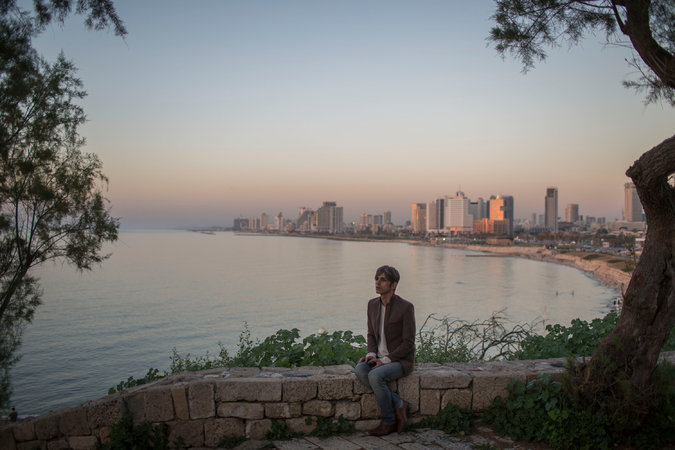Payam Feili in Tel Aviv on Tuesday. “The more I gained a reputation outside Iran, the harder it became for me to live in Iran,” he said. Credit Uriel Sinai for The New York Times
Visa Extension Granted to Gay Iranian Poet Seeking Asylum in Israel
JNS.org – At a time when Iran is known for its hostile attitude towards Israel, openly gay Iranian poet and novelist Payam Feili this week described how he found himself living in the Jewish state.
“The more I gained a reputation outside Iran, the harder it became for me to live in Iran,” Feili said during a Jerusalem press conference regarding his native country, which executes LGBT individuals, the New York Times reported. “Long before I left Iran, I thought that the only other place in the world I could live was Israel.”
Feili said that when he was still in Iran, he began working with an Israeli to translate his latest novella into Hebrew. This caused Iranian government loyalists to write articles accusing him of immorality and collaborating with the enemy. He escaped to Turkey in 2014 after being detained several times, and was able to enter Israel on a temporary visa as a visiting artist three months ago.
“The regime was pressing me to leave the country,” Feili said. “I got afraid. People warned me that the articles could be a harbinger of worse things to come.”
Before fleeing Iran, Feili already had an existing interest in the Jewish state after he watched movies about the Holocaust and read the Torah as a young man. Modern Israel “is exactly as I expected and even better and more beautiful,” he said.
Feili is living in Tel Aviv, which is home to a vibrant LGBT community. He is seeking asylum in Israel and has tattooed a Star of David on his neck.
Meanwhile, on Monday, Iran’s nuclear chief denied Israel’s legitimacy as a country in the latest anti-Zionist rhetoric emanating from the Islamic Republic.
TheTower.org
An openly gay Iranian poet who is seeking asylum in Israel has received an eight-month visa extension from the country’s interior ministry.
Payam Feili, whose native Iran considers homosexuality to be a crime punishable by death, was granted a tourist visa to visit Israel in December and applied for asylum in the Jewish state last month.
A soft-spoken 30-year-old with a Star of David tattooed on his neck, Feili says he wishes to continue his life in Israel, which he calls an “interesting, beautiful and amazing” place.
“For me, it’s not just another country,” he told Time on Wednesday. “For me it’s like a fairytale place.”
Feili has authored nine books, though only a censored edition his first work, a collection of poetry written when he was 19, was published in Iran. His subsequent works were barred by Iran’s Ministry of Culture and Islamic Guidance, and were instead published abroad. Feili, however, had never left Iran until two years ago.
“Actually, I didn’t live in Iran,” he reflected. “I lived my life inside my room. That’s where life would happen.” Feili was detained several times over the years due to his sexuality and public admiration for Israel, and decided to flee to Turkey in 2014, after Iranian agents tortured and confined him to a shipping container for 44 days.
In Istanbul, Feili finally had the opportunity to meet some of the Israelis with whom he had been corresponding online for years. After expressing his wish to travel to Israel in 2015, an Israeli friend offered to stage Feili’s latest published work—I Will Grow, I Will Bear Fruit… Figs, a novella narrated by a homosexual boy. Feili later obtained a tourist visa to see the Hebrew translation of the play with the assistance of Israel’s Ministry of Culture.
Feili currently resides on Tel Aviv’s trendy Lilienblum Street, which is dotted with dance clubs and bars, and has been embraced by the city’s gay community, according to The New York Times.
He said that he developed an interest in Israel after watching films about the Holocaust at a young age, and found the country to be “exactly as I expected and even better and more beautiful.”
“Long before I left Iran,” he said during a Jerusalem press conference earlier this week, “I thought that the only other place in the world I could live was Israel.”
Artists and intellectuals routinely face persecution in Iran. Officers from Iran’s Islamic Revolutionary Guard Corps detained poet and songwriter Yaghma Golrouee in December for filming a video criticizing the regime’s treatment of women. Golrouee, whose work features social commentary and reflections on love, had criticized authorities for barring his books from publication.
The Associated Press reported in October that the regime arrested and sentenced two Iranian poets to 99 lashes each “for shaking hands with members of the opposite sex.” The AP added that at least 30 journalists were imprisoned in Iran at the end of 2014. In November, after the regime’s arrest of five Iranian journalists, United Nations officials warned that Iran “should not silence critical or dissenting voices under the guise of vague and unsubstantiated national security concerns.”
Visa Extension Granted to Gay Iranian Poet Seeking Asylum in Israel











